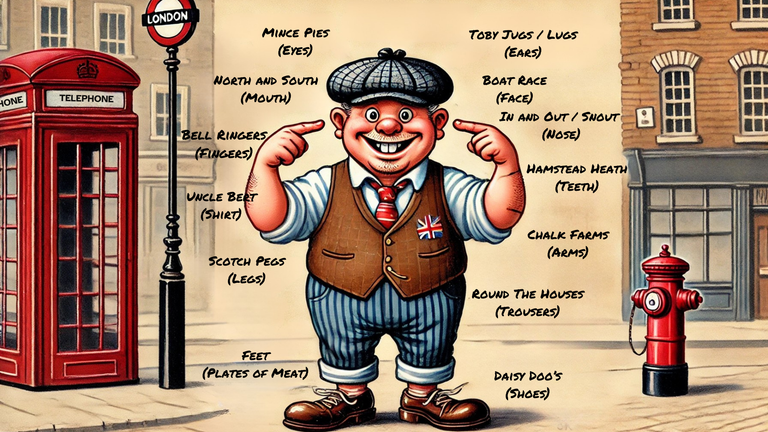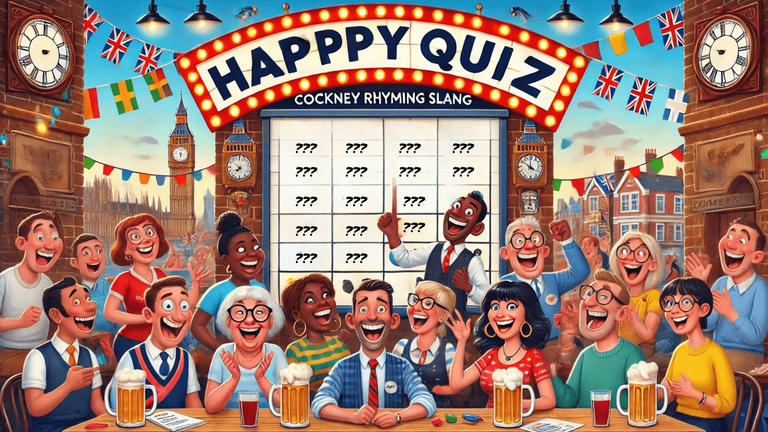Body Parts & Everyday Life

Cockney Rhyming Slang has some unique and interesting terms for body parts, like "Mince Pies" for eyes and "Plates of Meat" for feet. These rhyming phrases create humorous, coded expressions. Let's explore some of these quirky slang terms and see how they are used in everyday life.
Get ready to fill your "loaf" (head) with knowledge as we continue our exploration of Cockney Rhyming slang.
Cockney Rhyming Slang for Body Parts
Cockney rhyming slang uses clever rhymes to describe body parts in a fun and playful way. Here are some examples:
Eyes: “Mince pies”
“Mince pies” rhymes with “eyes.” People might say, “Keep your mince pies peeled,” meaning to watch out.Feet: “Plates of meat”
“Plates of meat” rhymes with “feet” and is often shortened to “plates.” If someone says, “Get on your plates,” they mean to start walking.Head: “Loaf of bread”
“Loaf of bread” rhymes with “head” and is usually shortened to “loaf.” Telling someone to “use your loaf” means to think or use common sense.Mouth: “North and south”
“North and south” rhymes with “mouth.” You might hear, “Shut your north and south,” meaning to be quiet.Arms: “Chalk farms”
“Chalk farms” rhymes with “arms.” Though less common today, it might be used in phrases like, “Get your chalk farms working.”Ears: “Toby Jugs / Lugs”
“Toby Jugs” rhymes with “lugs,” meaning ears. You might hear, “Use your Toby Jugs,” to remind someone to listen.Nose:“ In and Out / Snout”
“In and Out” rhymes with “snout,” referring to the nose. Someone might say, “Blow your In and Out,” when offering a tissue.Legs: “Scotch Pegs”
“Scotch Pegs” rhymes with “legs.” In a conversation, someone might say, “Stretch your Scotch Pegs,” when suggesting to relax.Fingers: “Bell Ringers”
“Bell Ringers” rhymes with “fingers.” You might say, “Wiggle your Bell Ringers,” to encourage someone to move their fingers.
These playful expressions add a colorful twist to everyday language.
Everyday Objects & Actions
Toilet: “Bog”
"Bog" is British slang for toilet, derived from “bog house.” It’s a casual term, like “Where’s the bog?” In Cockney rhyming slang, phrases like “cat and dog” and “Phileas Fogg” rhyme with “bog.”Bed: “Uncle Ned”
“Uncle Ned” rhymes with “bed.” It’s a friendly way to say you’re going to bed. For example, “I’m exhausted; I’m off to Uncle Ned!”Clothes: “Whistle and flute”
“Whistle and flute” rhymes with “suit,” referring to clothes, especially formal wear. You might hear, “You’re looking sharp in your whistle and flute!”Walk: “Ball of Chalk” “
Ball of chalk” rhymes with “walk.” Instead of saying, “Let’s go for a walk,” a Cockney might say, “Let’s have a ball,” where “ball of chalk” rhymes with “walk.”Trousers: “Round The Houses”
“Round The Houses” rhymes with “trousers.” Someone might say, “Pull up your Round The Houses,” when suggesting to fix one’s pants.Shirt: “Uncle Bert”
“Uncle Bert” rhymes with “shirt.” You could hear, “Grab your Uncle Bert,” when advising someone to wear a shirt.Shoes: “Daisy Doo’s”
“Daisy Doo’s” rhymes with “shoes.” You could hear, “Nice Daisy Doo’s!” when complimenting someone’s footwear.
Humor & Risqué Terms
Cockney slang often uses humor and cheek, sometimes getting a bit risqué.
Here are some examples:
Backside: “Khyber Pass” rhymes with “arse.” It’s a playful way to refer to one’s backside. You might hear, “Give your Khyber Pass a rest, you’ve been standing all day!” Other variations are Bottle of rum bum (bottom) and Big bass drum bum (bottom)
Breasts: “Bristols” comes from “Bristol City,” which rhymes with “titty.” It’s a cheeky term for breasts, typically used among friends.
Drunk: “Elephant’s trunk” rhymes with “drunk.” It humorously describes someone who’s intoxicated, like saying, “He’s a right elephant’s trunk!”
Why These Terms Stick: Humor, Culture, and Memory
Why do these unusual terms not only appear but also persist? There are numerous reasons for their lasting influence:
- Visual Humor: Phrases like “plates of meat” for feet and “mince pies” for eyes create funny images. These silly terms are both memorable and entertaining.
- Cultural Context: Cockney slang originates from East London’s working-class culture. It reflects everyday, practical life, giving it authenticity and meaning for the community.
- Memorability through Rhyme: Rhyming is a strong memory aid. Rhyming phrases are easier to remember than random words; the slang gets passed down from generation to generation.
- Sense of Community: Cockney slang shows you’re part of a group. It’s an insider language that creates a shared identity among Cockney speakers.
- Playfulness and Creativity: Cockney Rhyming Slang is playful and creative, showing a love for wordplay. It adds fun and imagination to conversations, making them humorous and colorful.

Quiz: Guess the Body Part with Cockney Rhyming Slang!
Can you match these Cockney slang terms to the right body part?
- Gregory Peck
- Hampsteads
- Syrup of Figs
- Boat Race
(Answers below!)
Answers:
- Neck
- Teeth
- Wig
- Face
Have you heard Cockney rhyming slang in real life or on TV? Share your stories and favorite phrases in the comments!
Preview of the Next Post
Curious about Cockney slang? We’ll explore words for money, food, and drinks. “Bees and honey” means money, and “Rosie lee” means tea. Don’t be a “berk” (find out what it means)! Stay tuned!
Images were created using ChatGPT and Canva, for which I hold a commercial license. Edited with the assistance of Grammarly.
#CWH #Language #Cockney #Rhyming #London
Thanks for the uncontrollable laughter!!!
I'm so surprised I'd never hear a single one of these before. I guess I need to know a lot more than Shawn the Sheep to consider myself an adopted Englishwoman.
Well done, funny man!
My loaf is blown!